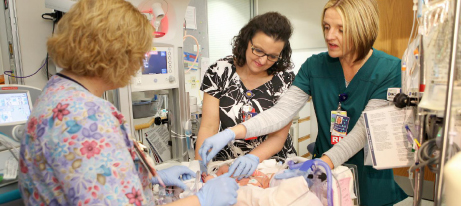
Cincinnati Children's
A rapid five-biomarker assay for sepsis in development for more than a decade classified severity of infection and predicted mortality risk in more than 400 pediatric patients. When adapted to mouse models, this blood test reliably predicted mortality risk and revealed that those with a higher risk for mortality had a heavier bacterial burden that responded to increased doses of antibiotics rather than anti-inflammatory medications. The results, published in Science Translational Medicine, could pave the way for new therapeutic approaches in sepsis management, according to the study authors.
Sepsis’ heterogeneity has made it difficult for researchers to develop new treatments for this deadly disease. However, the novel assay Pediatric Sepsis Biomarker Risk Model, or PERSEVERE, could help physicians pick the right dosages and drugs for patients, according to Hector Wong, MD, director of critical care medicine at Cincinnati Children’s Hospital Medical Center and a chief architect of the assay.
Wong and his colleagues in their study had two major goals: to prospectively test the PERSEVERE-based prognostic enrichment tool and to test whether PERSEVERE biomarkers were conserved in experimental mice challenged with sepsis, Wong told CLN Stat. “While this is fundamentally interesting, it also opens up many possibilities for testing precision medicine concepts for sepsis in the preclinical setting,” Wong said of the animal model.
PERSEVERE has been a work in progress for some time. Wong, who presented his developing biomarker test at the 2013 AACC Annual Scientific Meeting, has since worked to refine the assay platform, narrowing the number of candidate biomarkers from 80 to five. Each of these biomarkers reflects sepsis biology: C-C chemokine ligand 3 (CCL3); interleukin 8 (IL8); heat shock protein 70 kDa 1B (HSPA1B); granzyme B (GZMB), and matrix metallopeptidase 8 (MMP8). From this panel, Wong’s team crafted a model that estimated 28-day mortality risk in pediatric patients with septic shock.
PERSEVERE II, the new and improved test, tested the blood samples of a diverse group of 461 pediatric patients aged 1 to 18 years with severe sepsis. The patients had been admitted to intensive care units and were under care at Wong’s institution and others. Investigators determined that the five biomarkers reliably predicted the severity of infection and risk of death. “By demonstrating that PERSEVERE performed well during prospective testing, we are much more confident that it is a viable clinical tool for prognostic enrichment,” Wong said.
Adapting PERSEVERE II in mouse models, the same biomarkers were able to predict which mice were at high or low risk for infection. They also made an observation about treatment methods: High doses of antibiotics proved more effective than steroid drugs in improving survival. In both the human and mouse models, higher risk of sepsis were associated with a higher bacterial burden, suggesting that potent antibiotic doses could reduce death rates in patients with severe sepsis.
“This provides a rationale to conduct a clinical trial wherein high-risk patients are intensively monitored to optimize antibiotic dosing. This could be targeting of higher levels of antibiotics in the bloodstream, and/or broader spectrum antibiotics,” Wong said. Specifically selecting high-risk patients would optimize the risk to benefit ratio of higher intensity antibiotics, he added.
Wong and his colleagues now are refining the assay. This work “opens up many experimental opportunities, including the ability to test whether the PERSEVERE biomarkers are also therapeutic targets. In this way, PERSEVERE can move beyond prognostic enrichment, toward predictive enrichment,” Wong said.
The platform is slated for a federally funded clinical trial to test corticosteroids as a sepsis treatment. To advance his work to the clinic, Wong is hoping for a collaborative relationship with a biotech industry partners. Through Innovation Ventures, Cincinnati Children’s technology commercialization group, his team has acquired patents for the assay platform. An adult version of PERSEVERE is also in the works.